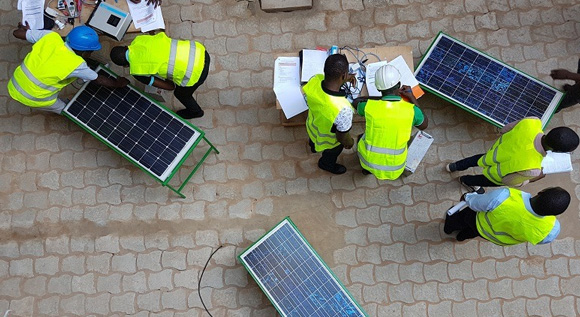11 climate-friendly energy solutions for the world
The Energy Export Initiative of the Federal Ministry for Economic Affairs and Energy supports providers of climate-friendly energy solutions across the globe. The number of projects under this initiative is expected to reach 100 by the end of this year.
 © dena
© dena
Up until then, it is worthwhile to look at the many full project reports that have been published on the initiative’s website: Viet Nam, Togo, Ghana, France, Honduras – the reference list of the Energy Export Initiative provides for a whole universe of ideas for climate-friendly energy solutions from across the world. The abstracts for what are almost 100 projects now are not just bursting with clever ideas and inventions. They also show the high level of commitment and dedication to a global energy transition that gives as many people as possible access to clean energy and affordable electricity. The Renewable Energy Solutions programme (RES) supports German companies as they implement reference projects at representative sites across the world and showcase these to the public.
In Togo, for instance, a country where only 8% of the rural population have access to electricity. Under Togo’s national strategy, all households are to be supplied with energy by 2030. By then, the country wants to increase the share of renewables in its energy mix to 50%. This requires a vast amount of energy expertise.
Learning matter: 3,400 installation technicians and engineers for Africa
This expertise can be offered by German companies such as PV specialist ‘maxx solar’ from the German state of Thuringia. As part of the Renewable Energy Solutions programme, an off-grid PV installation complete with a battery storage unit was put in place in Lomé, Togo, at the HQ of a local provider of PV systems who also operates a research and training unit. The project was part of the Renewable Energy Solutions programme. Demonstration installations like this one are an important milestone for companies seeking to access new markets.
The installation’s 105 solar modules generate some 90 kilowatt hours (kWh) of electricity per day. Unused power can be stored and used at night time or when there is little sunshine. The building is now operating completely independently. And – and this is special to Togo – the installed system not only provides electricity, it is also used for training sessions. Since 2012, the GREEN Solar Academy has trained up more than 3,400 African installation technicians and engineers, who can now put in place and operate PV installations and do maintenance work.
Funding: up to €65,000 per project
The German Energy Agency (dena) offers advice and support to those implementing such projects, especially to help them with relevant information or with marketing and training. The Federal Ministry for Economic Affairs and Energy supports this work, providing up to €65,000 per project. This funding can be used to establish sales structures, train up partners for sales and installations, and to inform potential customers about ways in which the products can be used. Close cooperation with representatives from business and politics allows participating companies to also build local networks.
The financing for the RES programme is provided by the Federal Ministry for Economic Affairs and Energy under its Energy Export Initiative. For the company ‘maxx solar’, for instance, this support has meant that they have been able to have staff of their own at the project in Togo and to build close relations with their local partner, KYA Energy. “This way, you can learn more about you mutual strengths and take the time to adjust the project to the situation in the region”, says Vivian Blümel, a representative of ‘maxx solar’.
Reading matter: many inspiring examples of projects for 2021
The Togolese project is the first of many inspiring examples from the Energy Export Initiative which are to be covered in detail on the website of the Energy Export Initiative before the 100th project will open at the end of 2021. By no means all the reports are about solar energy or PV installations. There are also projects for water treatment, efficient industrial equipment, floating PV installations, and biogas. Companies will will be reporting on how they have been able to harness the project and how their projects have been developing since.
The next round of applications for the RES programme begins in early 2022.
Further information
- German Energy Solutions - 100 projects under the Renewable Energy Solutions programme
- Information on the Energy Export Initiative, provided by dena
- Federal Ministry for Economic Affairs and Energy: The Energy Export Initiative
- German Energy Solutions – Interview with the Delegation of German Industry and Commerce in Ghana (AHK Ghana)

